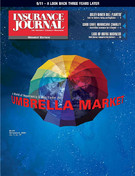Recent weeks seem to have brought insurers some silver lining amid dark clouds. Hurricane Charley, originally a Category 2 hurricane, was bumped up to Category 4 right as it hit land. And yet, after all the damage, the Insurance Services Office estimates insurers will only pick up about $6.8 billion of the tab. That may hurt some insurers’ quarterly profits, but it’s not going to send the property market reeling.
Meanwhile, just as the industry approaches the three-year anniversary of its greatest catastrophe (see “Three Years Later,” page N6), some believe it has found a bright spot in the draft of a Congressional bill called the State Modernization and Regulatory Transparency, or SMART, Act. Don’t you just love those clever acronyms? I wonder if that works when it comes time to vote. After all, the Congressman must think to himself, it would be dumb to vote against something called the SMART Act!
As detailed on page 8, the bill does exclude two concepts that many property/casualty insurer and agents groups feared: a federal insurance “czar” or an optional federal charter. The bill would ban prior approval of rates and would force the states to achieve greater uniformity. That includes producer licensing, where states would be required to have uniform standards as well as true reciprocity. This is all in the beginning stages, and many interest groups—including the Independent Insurance Agents and Brokers of America—have obviously decided to try to influence the direction of Congressional legislation rather than stand athwart history yelling, “Stop!”
This pragmatic approach may have left some rank-and-file agents behind, however. Mike Clark of the Hillsdale Agency in Hillsdale, Mich., wrote to me regarding an earlier Editor’s Note (“The Vision Thing,” June 21): “Your apparent support of federal regulation is disturbing as is IIABA’s support of it, regardless of how they phrase it. Federal regulation, as the companies and large brokers and agents want it structured, really means NO regulation, which will work entirely to their advantage with no benefit to the consumer and ordinary agent. It would tend, much like [Gramm-Leach-Bliley] did, to concentrate power and profit in the hands of a few large entities, which is the real intent of the push for so called ‘federal regulation’—no effective regulation.”
As I pointed out to Mr. Clark, my support for federal regulation could only be “apparent,” as opposed to explicit, as I honestly don’t hold a firm position on the matter. Still, Mr. Clark echoes a point of view I think many agents share, which is that state regulators play a healthy, substantial role in protecting agents and, in the end, consumers. Depending on the substance of federal action, that equation may change. Do you think more regulation of insurance companies is better for consumers? Does it matter whether the federal government or the states is doing the regulating?
I look forward to your feedback, and thanks for reading!
Was this article valuable?
Here are more articles you may enjoy.


 CFC Owners Said to Tap Banks for Sale, IPO of £5 Billion Insurer
CFC Owners Said to Tap Banks for Sale, IPO of £5 Billion Insurer  Viewpoint: Runoff Specialists Have Evolved Into Key Strategic Partners for Insurers
Viewpoint: Runoff Specialists Have Evolved Into Key Strategic Partners for Insurers  State Farm Adjuster’s Opinion Does Not Override Policy Exclusion in MS Sewage Backup
State Farm Adjuster’s Opinion Does Not Override Policy Exclusion in MS Sewage Backup  Former Broker, Co-Defendant Sentenced to 20 Years in Fraudulent ACA Sign-Ups
Former Broker, Co-Defendant Sentenced to 20 Years in Fraudulent ACA Sign-Ups 


